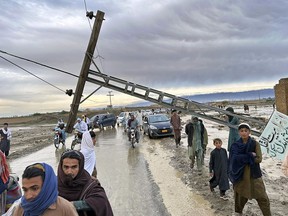Author of the article:
The Associated Press
Riaz Khan
Published Apr 20, 2024 • 1 minute read

PESHAWAR, Pakistan (AP) — A Pakistani province has issued a flood alert due to glacial melting and warned of heavy loss of life, officials said Saturday.
The country has witnessed days of extreme weather, killing scores of people and destroying property and farmland. Experts say Pakistan is experiencing heavier rains than normal in April because of climate change.
Advertisement 2
THIS CONTENT IS RESERVED FOR SUBSCRIBERS
Enjoy the latest local, national and international news.
- Exclusive articles by Conrad Black, Barbara Kay, Rex Murphy and others. Plus, special edition NP Platformed and First Reading newsletters and virtual events.
- Unlimited online access to National Post and 15 news sites with one account.
- National Post ePaper, an electronic replica of the print edition to view on any device, share and comment on.
- Daily puzzles including the New York Times Crossword.
- Support local journalism.
SUBSCRIBE FOR MORE ARTICLES
Enjoy the latest local, national and international news.
- Exclusive articles by Conrad Black, Barbara Kay, Rex Murphy and others. Plus, special edition NP Platformed and First Reading newsletters and virtual events.
- Unlimited online access to National Post and 15 news sites with one account.
- National Post ePaper, an electronic replica of the print edition to view on any device, share and comment on.
- Daily puzzles including the New York Times Crossword.
- Support local journalism.
REGISTER / SIGN IN TO UNLOCK MORE ARTICLES
Create an account or sign in to continue with your reading experience.
- Access articles from across Canada with one account.
- Share your thoughts and join the conversation in the comments.
- Enjoy additional articles per month.
- Get email updates from your favourite authors.
Article content
Article content
In the mountainous northwest province of Khyber Pakhtunkhwa, which has been hit particularly hard by the deluges, authorities issued a flood alert because of the melting of glaciers in several districts.
They said the flood could worsen and that people should move to safer locations ahead of any danger.
“If timely safety measures are not taken, there is a possibility of heavy loss of life and property due to the expected flood situation,” said Muhammad Qaiser Khan, from the local disaster management authority.
Latest figures from the province said that 46 people, including 25 children, have died in the past five days due to rain-related incidents.
At least 2,875 houses and 26 schools have either collapsed or been damaged.
The southwest province of Baluchistan has also been battered by rainfall. It said it had limited resources to deal with the current situation but if the rains continued, it would look to the central government for help.
In 2022, downpours swelled rivers and at one point inundated one-third of Pakistan, killing 1,739 people. The floods also caused $30 billion in damage.
Pakistan’s monsoon season starts in June.
Article content
.png)
 1 week ago
20
1 week ago
20


























 Bengali (BD) ·
Bengali (BD) ·  English (US) ·
English (US) ·